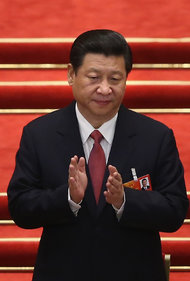Mr. Lew, 57, a master of the intricacies of the United States budget who has less foreign experience than his predecessors, raised the topic of cybersecurity, a significant issue in the relationship between Washington and Beijing, American officials said. He also talked about North Korea’s nuclear program, a topic not normally on a Treasury secretary’s agenda, they said.
Mr. Xi noted that while the United States and China had “enormous shared interests, of course, unavoidably we have some differences.”
It has been unusual for Chinese leaders to draw attention to stark divisions with the United States. Mr. Xi’s choice of words showed confidence that he could manage the problems, and hinted at a lowering of expectations about developing a strategic relationship with the United States, an idea that had been proffered in the past, diplomats here said.
Contacts between Washington and Beijing have been sparse over the past three months during China’s protracted political transition. It began in November when Mr. Xi took over as head of the Communist Party, and ended last week with his ascension to the presidency at the annual session of the National People’s Congress.
For reasons of protocol, President Obama did not speak with Mr. Xi until last week, when he called the new Chinese president to congratulate him and to outline the issues at hand, including North Korea and cybersecurity.
The White House has directly accused China of widespread theft of data from American computer networks, including those of American businesses involved in the Chinese market. China’s cyberespionage against American commercial interests has attracted strong attention in Congress that could have negative consequences for China, analysts said.
“If we don’t see progress, that could increase the prospects for a political backlash that would lead to greater scrutiny of Chinese investment in the United States,” said Myron A. Brilliant, senior vice president for international affairs at the American Chamber of Commerce in Washington.
On North Korea, the Obama administration wants to know whether Beijing will enforce the new sanctions that the United Nations Security Council imposed on the North, with China voting in favor. The administration has also announced an expansion of missile defense capabilities in an effort to deter North Korea, a message that implied that China should restrain its nuclear-armed ally or face an expanding American military focus on Asia.
Mr. Xi appears to have gone out of his way to ensure that he met Mr. Lew before leaving Friday for his first foreign trip as president, which will include two days in Moscow, followed by a three-nation tour of Africa. Mr. Lew is the first foreign official Mr. Xi has met as president, and Mr. Xi endowed some meaning to his phrase to Mr. Lew that he attached “great importance” to the relationship between China and the United States.
At the same time, however, Chinese commentators have noted that Secretary of State John Kerry chose to make his first trip abroad an extended journey to Europe and the Middle East, unlike his predecessor, Hillary Rodham Clinton, who visited Asian nations first, including China. Mr. Kerry is expected to be in China next month as part of an Asian tour, administration officials said.
This trip is Mr. Lew’s first to China, according to administration officials. The previous two Treasury secretaries, Henry M. Paulson Jr. and Timothy F. Geithner, were experts on China, and for the past seven years they played dominant roles in the relationship between the countries.
Mr. Lew arrived in Beijing on Tuesday morning and went almost immediately to the Great Hall of the People. He was accompanied by an under secretary of the Treasury, Lael Brainard, and a senior official of the National Security Council who specializes in China, Evan Medeiros.
As Mr. Lew and Mr. Xi sat side by side in large, white-upholstered armchairs, Mr. Lew stressed in comments caught by reporters that the United States had seen 14 quarters of economic growth, that the housing market was “coming back,” and that a “revolution” was under way in the energy sector, a reference to shale gas production. After that, reporters were ushered out.
The meeting lasted about 45 minutes, according to Mr. Lew’s aides. The secretary stressed the need for a relationship marked by “healthy competition rather than strategic rivalry,” a Treasury Department statement said.
Later, Mr. Lew met with Xu Shaoshi, the new chairman of the National Development and Reform Commission, the powerful agency that manages the domestic economy. He was scheduled to have dinner with the new finance minister, Lou Jiwei, and Wednesday he is to meet with China’s new prime minister, Li Keqiang.
For his first lunch in China, Mr. Lew repaired to the Bao Yuan Dumpling House, an informal restaurant with laminated tabletops close to the United States Embassy.
There, with two staff members, he ate a variety of the house specialties, using chopsticks. The bill: 109 renminbi, or roughly $6 a head.
This article has been revised to reflect the following correction:
Correction: March 19, 2013
An earlier version of this article misspelled the surname of a senior official of the National Security Council. He is Evan Medeiros, not Madeiros.
Article source: http://www.nytimes.com/2013/03/20/world/asia/us-treasury-secretary-and-chinese-president-meet.html?partner=rss&emc=rss
